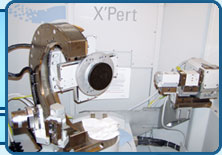| |
 |
 |
 |
 |
 |



 укр укр
 eng eng
|
 |
|
|
| |
- High-resolution X-ray diffractometer X'Pert Pro MRD XL Ext. Double-crystal and triple-crystal diffraction schemes, glancing-incidence diffraction and reflectometry. Analysis of thin layers, quantum dots size and shape, lateral strain, chemical composition. (Holland)
- X'Pert MRD Applications
X'Pert Epitaxy has been developed for materials scientists analyzing problems using x-ray diffraction measurements. X'Pert Epitaxy is used to analyze data recorded using X'Pert PRO Diffractometers to determine the crystal quality of deposited layers. The thin layers may range from near perfect single crystals (for example: III-V semiconductor laser structures) to textured polycrystalline (for example: magnetic oxide layers).
The functionality includes:
-calculating the mismatch, composition, thickness and relaxation of layers from rocking curves and maps
-analysis of regular arrays of rocking curves recorded from a wafer
-simulation and automatic fitting of rocking curves for semiconductors
The materials which can be analyzed using X'Pert Epitaxy include
III-V compound semiconductors: GaAs, AIGaAs, InP, InGaAs, InSb and so on
II-VI compound semiconductors: CdTe, HgCdTe, ZnSe, ZnTe
gallium nitride based device structures
silicon, silicon germanium alloys
epitaxial high Tc superconductors
epitaxial metallic layers and multilayers
highly oriented polycrystalline layers: PtSi on Si and so on
ferroelectric non-volatile RAM structures
X'Pert Epitaxy can extract information on structural parameters such as:
lattice mismatch between layer and substrate
alloy composition of layer
layer thickness
superlattice period
substrate curvature
mosaic spread
layer relaxation
For information about data collecting procedures see:
The Diffractometer Axes
The Reciprocal Space Interface
Scaling in Reciprocal Space
Single Scan Directions in Reciprocal Space
Area scans
Diffractometer Resolution
The Reciprocal Lattice of Real Samples
Recording a Rocking Curve
- Double-crystal diffractometer DRON-3 with copper radiation. Applied in standard coplanar diffraction cheme for investigation of A3B5 compounds. (Russia)
- Triple-crystal diffractometer TRS-001 with superposed optical axes. Applied in standard coplanar diffraction scheme for analysis of thin layers, lateral strain, chemical composition. (Russia)
- Double-crystal diffractometer DRON-3 with copper radiation. Applied in standard coplanar diffraction scheme for investigation of Si, Ge compounds. (Russia)
- Powder diffractometer DRON-3M with copper radiation. Applied in standard coplanar diffraction scheme for investigation polycristalline and amorphous compounds, phase analysis. (Russia)
- Single-crystal X-ray diffractometer DRON-3M with copper anode. Applied in standard coplanar diffraction scheme for investigation of energetic dependencies near K-absorption edge. (Russia)
|
|
 |
|
|
© 2006-2026 |
|
|



 укр
укр
 eng
eng